NURSING CASE STUDY ANALYSIS: Hanan's Mental Health Challenges
VerifiedAdded on 2023/03/20
|6
|1452
|71
Case Study
AI Summary
This case study analyzes the mental health challenges of Hanan, who is experiencing suicidal ideations, anxiety, and other related issues. The analysis explores the patient's background, including her displacement from Syria, loss of her husband, and difficulties with her children. The assignment identifies key healthcare complications, such as suicidal ideation and feelings of uncertainty, and proposes interventions like cognitive behavioral therapy and communication therapy. It also highlights the importance of ethical and legal considerations in providing care, emphasizing beneficence and culturally competent care. The study references relevant literature to support the proposed interventions and ethical approaches, providing a comprehensive overview of the patient's situation and potential solutions.
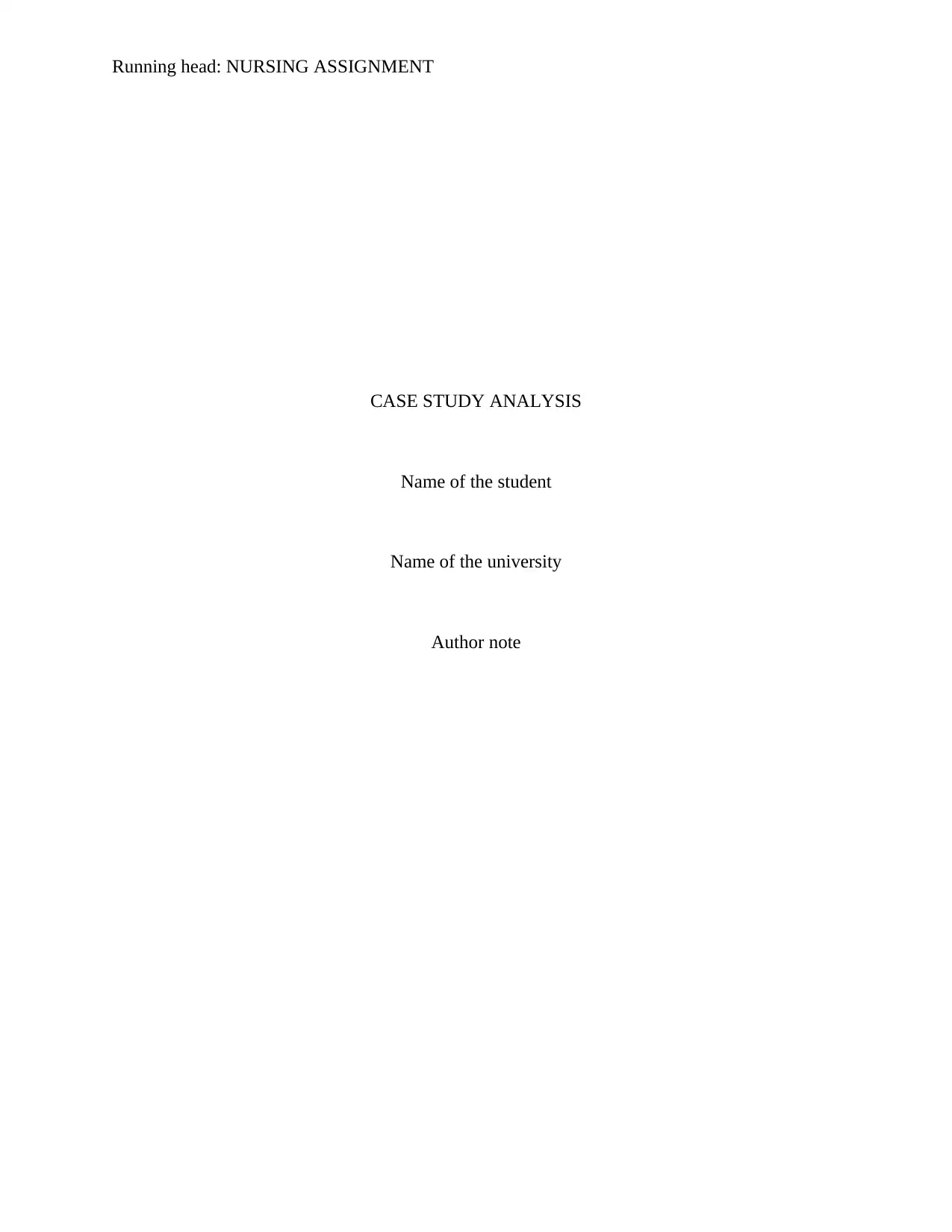
Running head: NURSING ASSIGNMENT
CASE STUDY ANALYSIS
Name of the student
Name of the university
Author note
CASE STUDY ANALYSIS
Name of the student
Name of the university
Author note
Paraphrase This Document
Need a fresh take? Get an instant paraphrase of this document with our AI Paraphraser
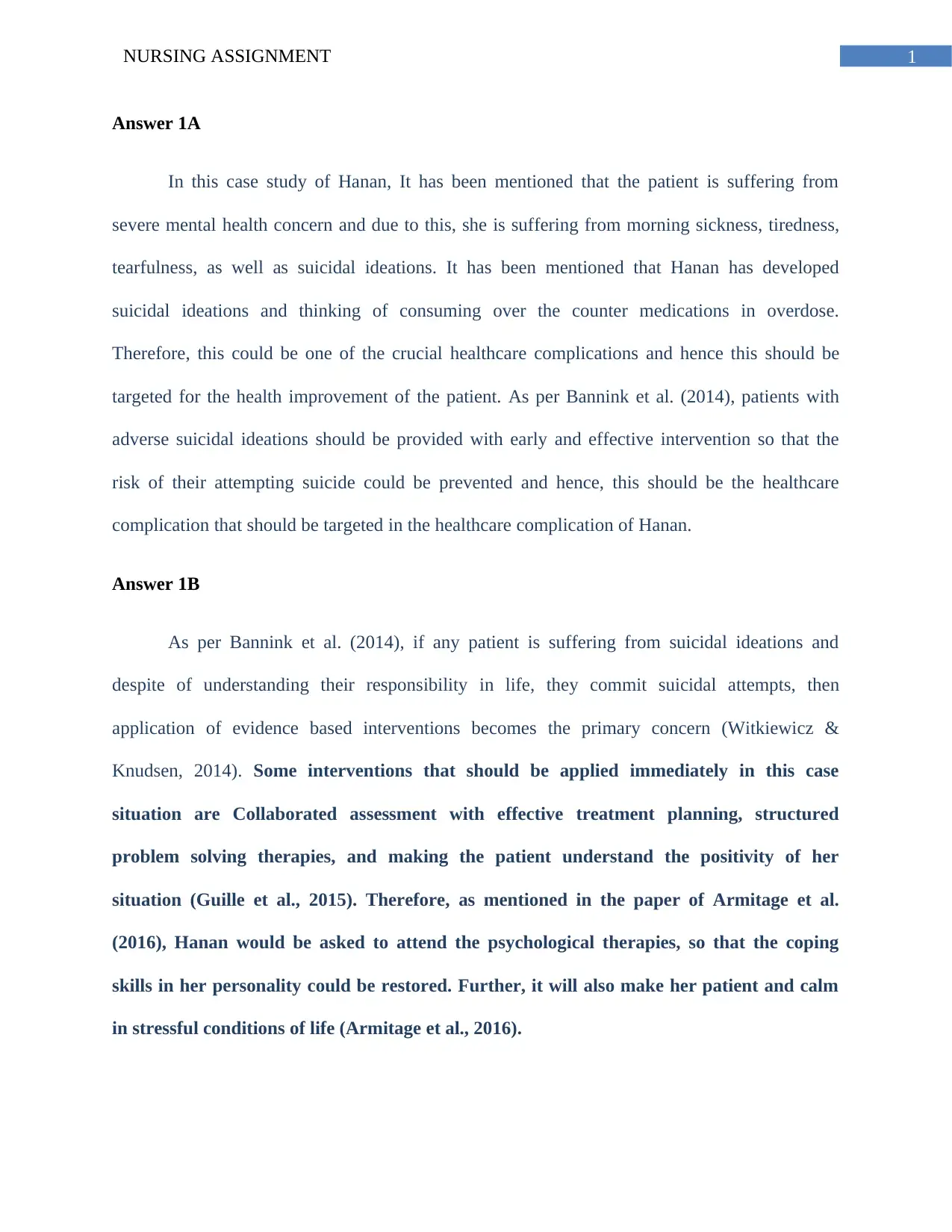
1NURSING ASSIGNMENT
Answer 1A
In this case study of Hanan, It has been mentioned that the patient is suffering from
severe mental health concern and due to this, she is suffering from morning sickness, tiredness,
tearfulness, as well as suicidal ideations. It has been mentioned that Hanan has developed
suicidal ideations and thinking of consuming over the counter medications in overdose.
Therefore, this could be one of the crucial healthcare complications and hence this should be
targeted for the health improvement of the patient. As per Bannink et al. (2014), patients with
adverse suicidal ideations should be provided with early and effective intervention so that the
risk of their attempting suicide could be prevented and hence, this should be the healthcare
complication that should be targeted in the healthcare complication of Hanan.
Answer 1B
As per Bannink et al. (2014), if any patient is suffering from suicidal ideations and
despite of understanding their responsibility in life, they commit suicidal attempts, then
application of evidence based interventions becomes the primary concern (Witkiewicz &
Knudsen, 2014). Some interventions that should be applied immediately in this case
situation are Collaborated assessment with effective treatment planning, structured
problem solving therapies, and making the patient understand the positivity of her
situation (Guille et al., 2015). Therefore, as mentioned in the paper of Armitage et al.
(2016), Hanan would be asked to attend the psychological therapies, so that the coping
skills in her personality could be restored. Further, it will also make her patient and calm
in stressful conditions of life (Armitage et al., 2016).
Answer 1A
In this case study of Hanan, It has been mentioned that the patient is suffering from
severe mental health concern and due to this, she is suffering from morning sickness, tiredness,
tearfulness, as well as suicidal ideations. It has been mentioned that Hanan has developed
suicidal ideations and thinking of consuming over the counter medications in overdose.
Therefore, this could be one of the crucial healthcare complications and hence this should be
targeted for the health improvement of the patient. As per Bannink et al. (2014), patients with
adverse suicidal ideations should be provided with early and effective intervention so that the
risk of their attempting suicide could be prevented and hence, this should be the healthcare
complication that should be targeted in the healthcare complication of Hanan.
Answer 1B
As per Bannink et al. (2014), if any patient is suffering from suicidal ideations and
despite of understanding their responsibility in life, they commit suicidal attempts, then
application of evidence based interventions becomes the primary concern (Witkiewicz &
Knudsen, 2014). Some interventions that should be applied immediately in this case
situation are Collaborated assessment with effective treatment planning, structured
problem solving therapies, and making the patient understand the positivity of her
situation (Guille et al., 2015). Therefore, as mentioned in the paper of Armitage et al.
(2016), Hanan would be asked to attend the psychological therapies, so that the coping
skills in her personality could be restored. Further, it will also make her patient and calm
in stressful conditions of life (Armitage et al., 2016).
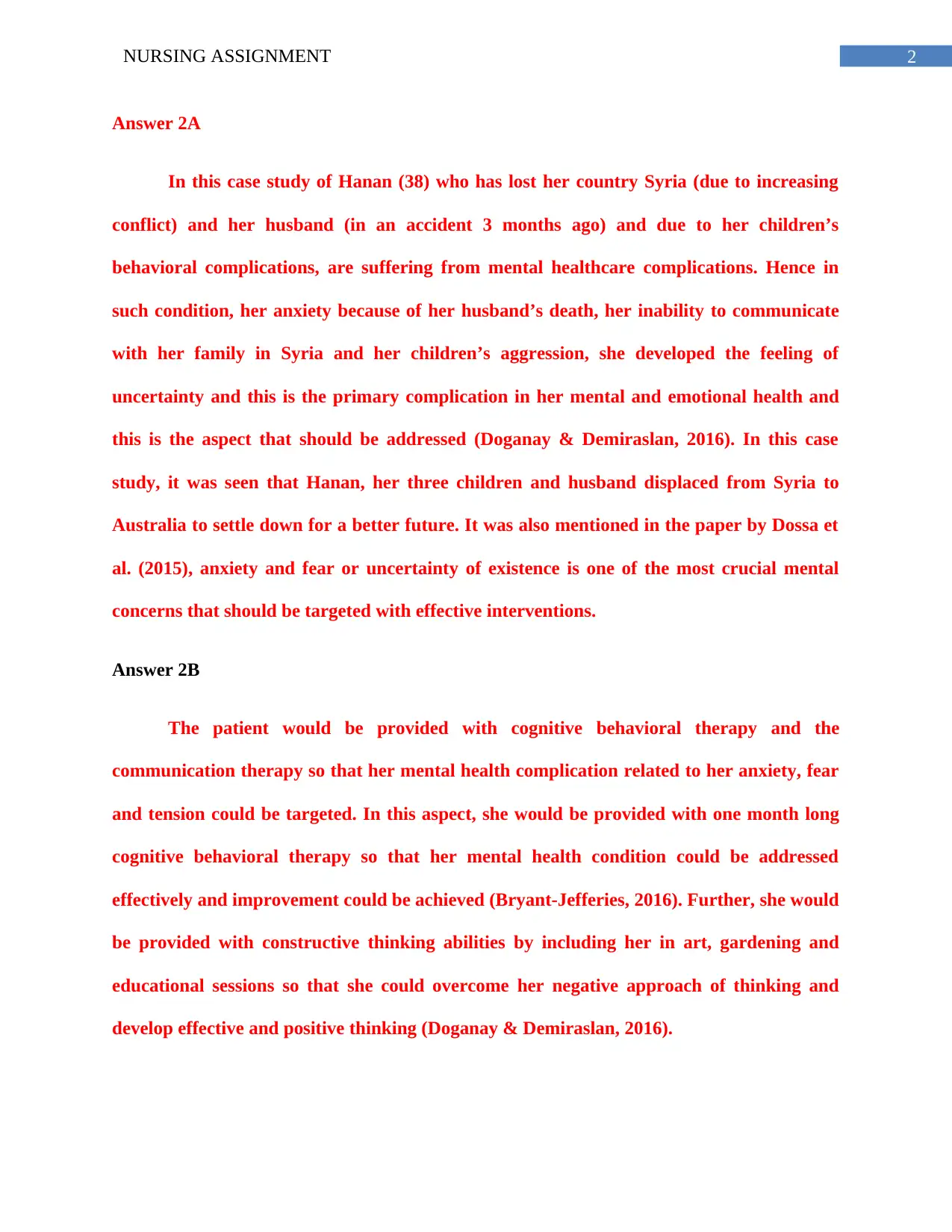
2NURSING ASSIGNMENT
Answer 2A
In this case study of Hanan (38) who has lost her country Syria (due to increasing
conflict) and her husband (in an accident 3 months ago) and due to her children’s
behavioral complications, are suffering from mental healthcare complications. Hence in
such condition, her anxiety because of her husband’s death, her inability to communicate
with her family in Syria and her children’s aggression, she developed the feeling of
uncertainty and this is the primary complication in her mental and emotional health and
this is the aspect that should be addressed (Doganay & Demiraslan, 2016). In this case
study, it was seen that Hanan, her three children and husband displaced from Syria to
Australia to settle down for a better future. It was also mentioned in the paper by Dossa et
al. (2015), anxiety and fear or uncertainty of existence is one of the most crucial mental
concerns that should be targeted with effective interventions.
Answer 2B
The patient would be provided with cognitive behavioral therapy and the
communication therapy so that her mental health complication related to her anxiety, fear
and tension could be targeted. In this aspect, she would be provided with one month long
cognitive behavioral therapy so that her mental health condition could be addressed
effectively and improvement could be achieved (Bryant-Jefferies, 2016). Further, she would
be provided with constructive thinking abilities by including her in art, gardening and
educational sessions so that she could overcome her negative approach of thinking and
develop effective and positive thinking (Doganay & Demiraslan, 2016).
Answer 2A
In this case study of Hanan (38) who has lost her country Syria (due to increasing
conflict) and her husband (in an accident 3 months ago) and due to her children’s
behavioral complications, are suffering from mental healthcare complications. Hence in
such condition, her anxiety because of her husband’s death, her inability to communicate
with her family in Syria and her children’s aggression, she developed the feeling of
uncertainty and this is the primary complication in her mental and emotional health and
this is the aspect that should be addressed (Doganay & Demiraslan, 2016). In this case
study, it was seen that Hanan, her three children and husband displaced from Syria to
Australia to settle down for a better future. It was also mentioned in the paper by Dossa et
al. (2015), anxiety and fear or uncertainty of existence is one of the most crucial mental
concerns that should be targeted with effective interventions.
Answer 2B
The patient would be provided with cognitive behavioral therapy and the
communication therapy so that her mental health complication related to her anxiety, fear
and tension could be targeted. In this aspect, she would be provided with one month long
cognitive behavioral therapy so that her mental health condition could be addressed
effectively and improvement could be achieved (Bryant-Jefferies, 2016). Further, she would
be provided with constructive thinking abilities by including her in art, gardening and
educational sessions so that she could overcome her negative approach of thinking and
develop effective and positive thinking (Doganay & Demiraslan, 2016).
⊘ This is a preview!⊘
Do you want full access?
Subscribe today to unlock all pages.

Trusted by 1+ million students worldwide
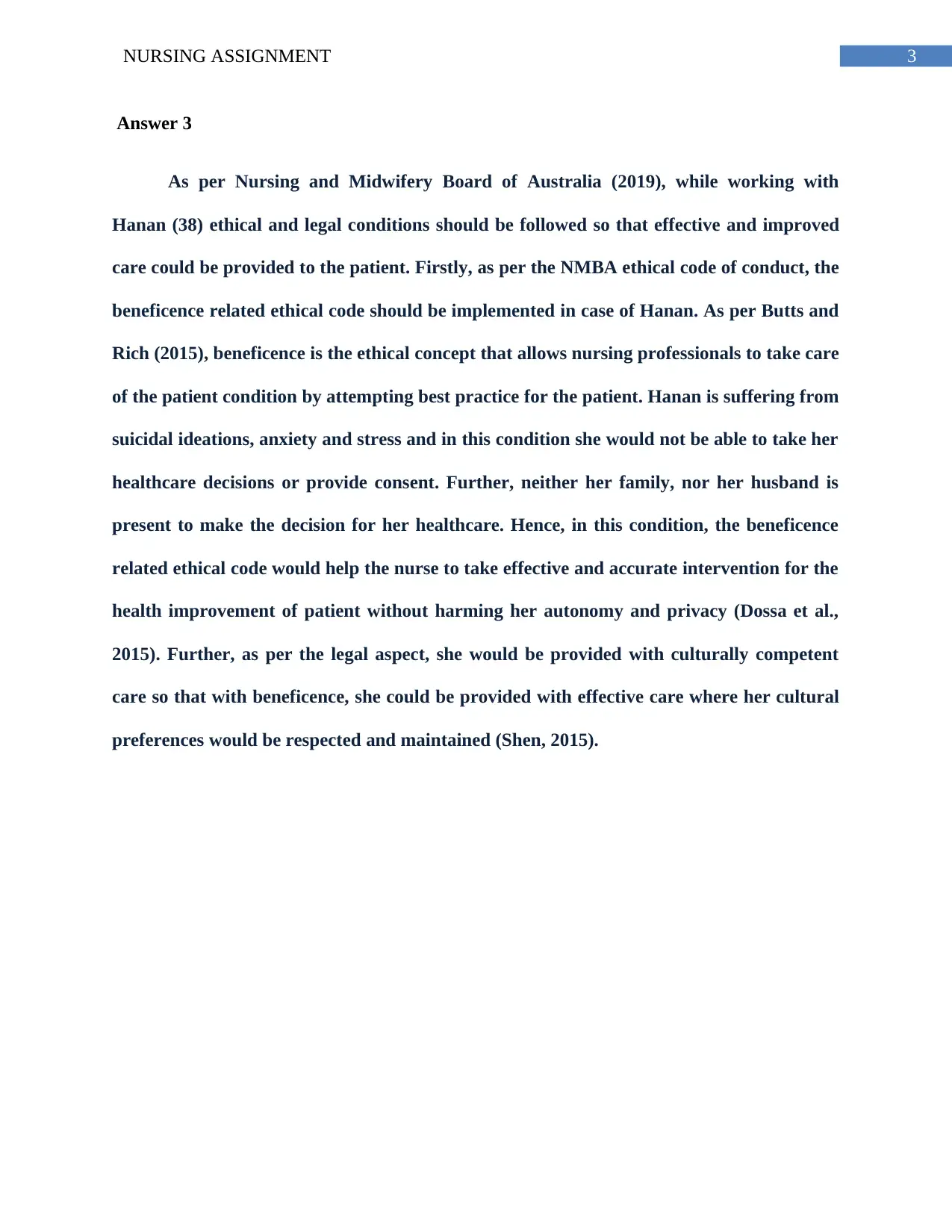
3NURSING ASSIGNMENT
Answer 3
As per Nursing and Midwifery Board of Australia (2019), while working with
Hanan (38) ethical and legal conditions should be followed so that effective and improved
care could be provided to the patient. Firstly, as per the NMBA ethical code of conduct, the
beneficence related ethical code should be implemented in case of Hanan. As per Butts and
Rich (2015), beneficence is the ethical concept that allows nursing professionals to take care
of the patient condition by attempting best practice for the patient. Hanan is suffering from
suicidal ideations, anxiety and stress and in this condition she would not be able to take her
healthcare decisions or provide consent. Further, neither her family, nor her husband is
present to make the decision for her healthcare. Hence, in this condition, the beneficence
related ethical code would help the nurse to take effective and accurate intervention for the
health improvement of patient without harming her autonomy and privacy (Dossa et al.,
2015). Further, as per the legal aspect, she would be provided with culturally competent
care so that with beneficence, she could be provided with effective care where her cultural
preferences would be respected and maintained (Shen, 2015).
Answer 3
As per Nursing and Midwifery Board of Australia (2019), while working with
Hanan (38) ethical and legal conditions should be followed so that effective and improved
care could be provided to the patient. Firstly, as per the NMBA ethical code of conduct, the
beneficence related ethical code should be implemented in case of Hanan. As per Butts and
Rich (2015), beneficence is the ethical concept that allows nursing professionals to take care
of the patient condition by attempting best practice for the patient. Hanan is suffering from
suicidal ideations, anxiety and stress and in this condition she would not be able to take her
healthcare decisions or provide consent. Further, neither her family, nor her husband is
present to make the decision for her healthcare. Hence, in this condition, the beneficence
related ethical code would help the nurse to take effective and accurate intervention for the
health improvement of patient without harming her autonomy and privacy (Dossa et al.,
2015). Further, as per the legal aspect, she would be provided with culturally competent
care so that with beneficence, she could be provided with effective care where her cultural
preferences would be respected and maintained (Shen, 2015).
Paraphrase This Document
Need a fresh take? Get an instant paraphrase of this document with our AI Paraphraser
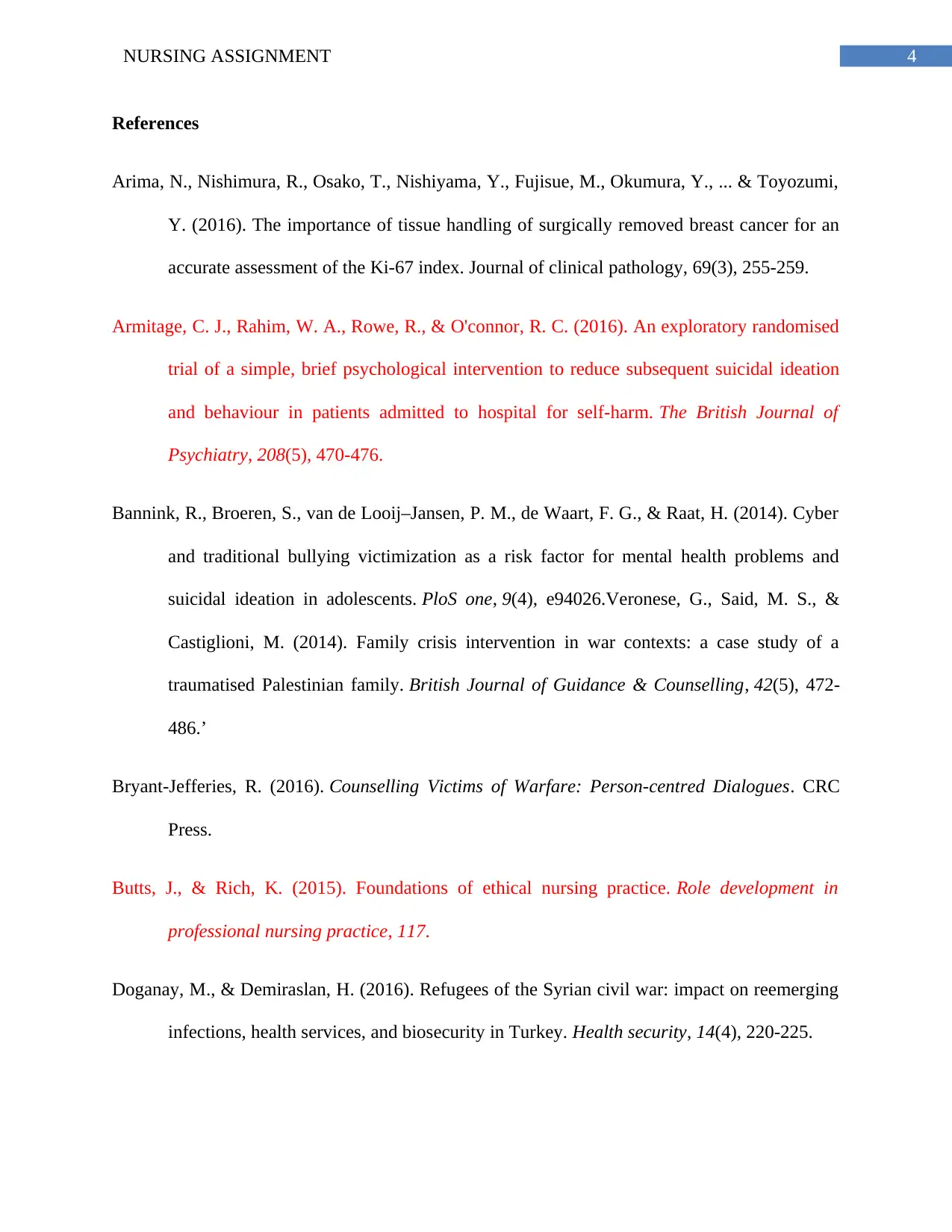
4NURSING ASSIGNMENT
References
Arima, N., Nishimura, R., Osako, T., Nishiyama, Y., Fujisue, M., Okumura, Y., ... & Toyozumi,
Y. (2016). The importance of tissue handling of surgically removed breast cancer for an
accurate assessment of the Ki-67 index. Journal of clinical pathology, 69(3), 255-259.
Armitage, C. J., Rahim, W. A., Rowe, R., & O'connor, R. C. (2016). An exploratory randomised
trial of a simple, brief psychological intervention to reduce subsequent suicidal ideation
and behaviour in patients admitted to hospital for self-harm. The British Journal of
Psychiatry, 208(5), 470-476.
Bannink, R., Broeren, S., van de Looij–Jansen, P. M., de Waart, F. G., & Raat, H. (2014). Cyber
and traditional bullying victimization as a risk factor for mental health problems and
suicidal ideation in adolescents. PloS one, 9(4), e94026.Veronese, G., Said, M. S., &
Castiglioni, M. (2014). Family crisis intervention in war contexts: a case study of a
traumatised Palestinian family. British Journal of Guidance & Counselling, 42(5), 472-
486.’
Bryant-Jefferies, R. (2016). Counselling Victims of Warfare: Person-centred Dialogues. CRC
Press.
Butts, J., & Rich, K. (2015). Foundations of ethical nursing practice. Role development in
professional nursing practice, 117.
Doganay, M., & Demiraslan, H. (2016). Refugees of the Syrian civil war: impact on reemerging
infections, health services, and biosecurity in Turkey. Health security, 14(4), 220-225.
References
Arima, N., Nishimura, R., Osako, T., Nishiyama, Y., Fujisue, M., Okumura, Y., ... & Toyozumi,
Y. (2016). The importance of tissue handling of surgically removed breast cancer for an
accurate assessment of the Ki-67 index. Journal of clinical pathology, 69(3), 255-259.
Armitage, C. J., Rahim, W. A., Rowe, R., & O'connor, R. C. (2016). An exploratory randomised
trial of a simple, brief psychological intervention to reduce subsequent suicidal ideation
and behaviour in patients admitted to hospital for self-harm. The British Journal of
Psychiatry, 208(5), 470-476.
Bannink, R., Broeren, S., van de Looij–Jansen, P. M., de Waart, F. G., & Raat, H. (2014). Cyber
and traditional bullying victimization as a risk factor for mental health problems and
suicidal ideation in adolescents. PloS one, 9(4), e94026.Veronese, G., Said, M. S., &
Castiglioni, M. (2014). Family crisis intervention in war contexts: a case study of a
traumatised Palestinian family. British Journal of Guidance & Counselling, 42(5), 472-
486.’
Bryant-Jefferies, R. (2016). Counselling Victims of Warfare: Person-centred Dialogues. CRC
Press.
Butts, J., & Rich, K. (2015). Foundations of ethical nursing practice. Role development in
professional nursing practice, 117.
Doganay, M., & Demiraslan, H. (2016). Refugees of the Syrian civil war: impact on reemerging
infections, health services, and biosecurity in Turkey. Health security, 14(4), 220-225.
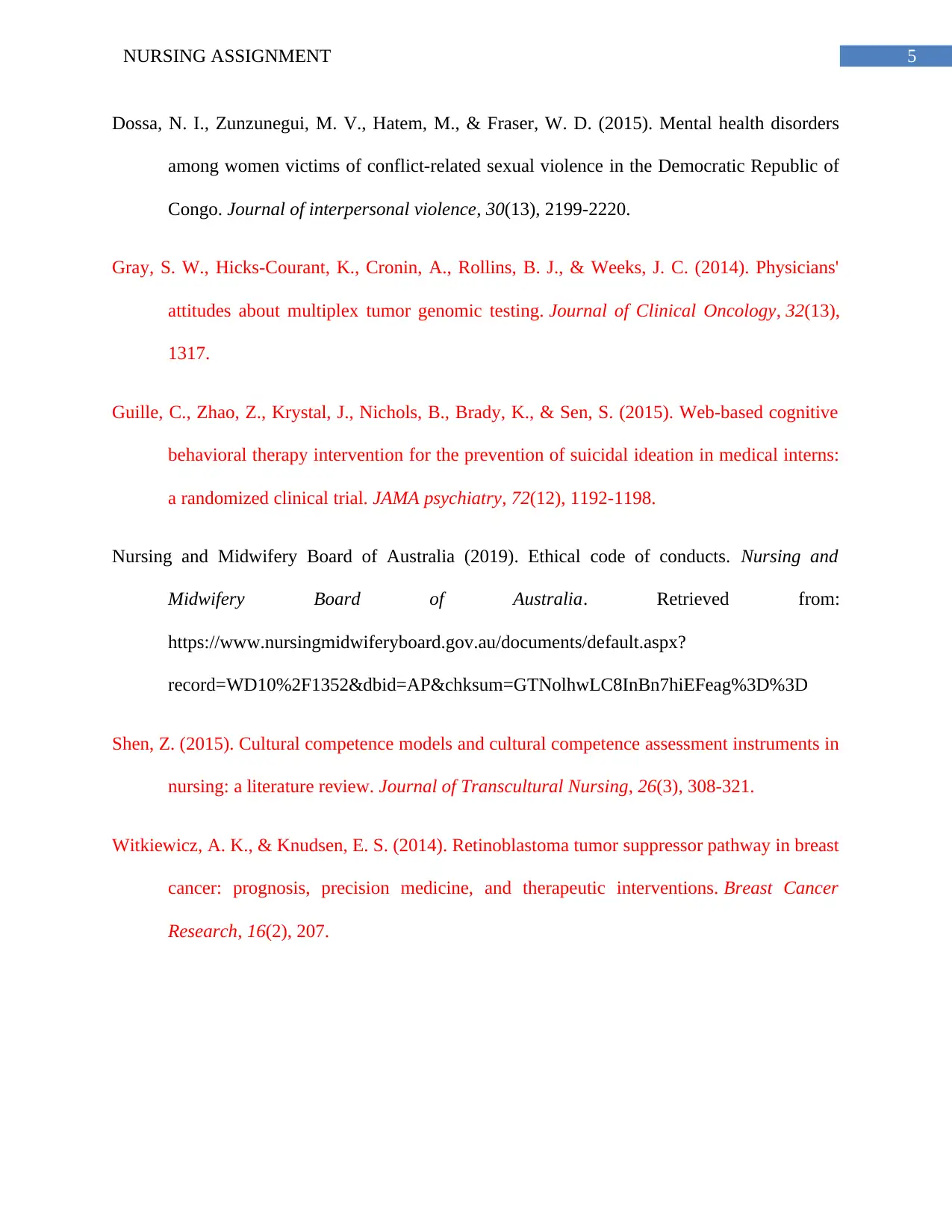
5NURSING ASSIGNMENT
Dossa, N. I., Zunzunegui, M. V., Hatem, M., & Fraser, W. D. (2015). Mental health disorders
among women victims of conflict-related sexual violence in the Democratic Republic of
Congo. Journal of interpersonal violence, 30(13), 2199-2220.
Gray, S. W., Hicks-Courant, K., Cronin, A., Rollins, B. J., & Weeks, J. C. (2014). Physicians'
attitudes about multiplex tumor genomic testing. Journal of Clinical Oncology, 32(13),
1317.
Guille, C., Zhao, Z., Krystal, J., Nichols, B., Brady, K., & Sen, S. (2015). Web-based cognitive
behavioral therapy intervention for the prevention of suicidal ideation in medical interns:
a randomized clinical trial. JAMA psychiatry, 72(12), 1192-1198.
Nursing and Midwifery Board of Australia (2019). Ethical code of conducts. Nursing and
Midwifery Board of Australia. Retrieved from:
https://www.nursingmidwiferyboard.gov.au/documents/default.aspx?
record=WD10%2F1352&dbid=AP&chksum=GTNolhwLC8InBn7hiEFeag%3D%3D
Shen, Z. (2015). Cultural competence models and cultural competence assessment instruments in
nursing: a literature review. Journal of Transcultural Nursing, 26(3), 308-321.
Witkiewicz, A. K., & Knudsen, E. S. (2014). Retinoblastoma tumor suppressor pathway in breast
cancer: prognosis, precision medicine, and therapeutic interventions. Breast Cancer
Research, 16(2), 207.
Dossa, N. I., Zunzunegui, M. V., Hatem, M., & Fraser, W. D. (2015). Mental health disorders
among women victims of conflict-related sexual violence in the Democratic Republic of
Congo. Journal of interpersonal violence, 30(13), 2199-2220.
Gray, S. W., Hicks-Courant, K., Cronin, A., Rollins, B. J., & Weeks, J. C. (2014). Physicians'
attitudes about multiplex tumor genomic testing. Journal of Clinical Oncology, 32(13),
1317.
Guille, C., Zhao, Z., Krystal, J., Nichols, B., Brady, K., & Sen, S. (2015). Web-based cognitive
behavioral therapy intervention for the prevention of suicidal ideation in medical interns:
a randomized clinical trial. JAMA psychiatry, 72(12), 1192-1198.
Nursing and Midwifery Board of Australia (2019). Ethical code of conducts. Nursing and
Midwifery Board of Australia. Retrieved from:
https://www.nursingmidwiferyboard.gov.au/documents/default.aspx?
record=WD10%2F1352&dbid=AP&chksum=GTNolhwLC8InBn7hiEFeag%3D%3D
Shen, Z. (2015). Cultural competence models and cultural competence assessment instruments in
nursing: a literature review. Journal of Transcultural Nursing, 26(3), 308-321.
Witkiewicz, A. K., & Knudsen, E. S. (2014). Retinoblastoma tumor suppressor pathway in breast
cancer: prognosis, precision medicine, and therapeutic interventions. Breast Cancer
Research, 16(2), 207.
⊘ This is a preview!⊘
Do you want full access?
Subscribe today to unlock all pages.

Trusted by 1+ million students worldwide
1 out of 6
Related Documents
Your All-in-One AI-Powered Toolkit for Academic Success.
+13062052269
info@desklib.com
Available 24*7 on WhatsApp / Email
![[object Object]](/_next/static/media/star-bottom.7253800d.svg)
Unlock your academic potential
Copyright © 2020–2026 A2Z Services. All Rights Reserved. Developed and managed by ZUCOL.





